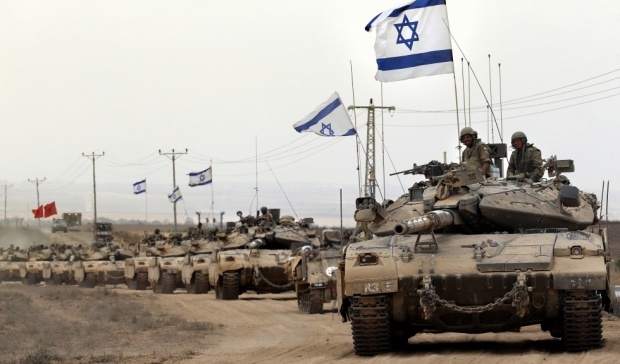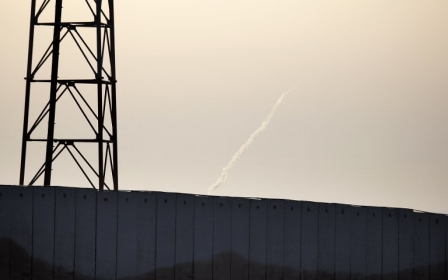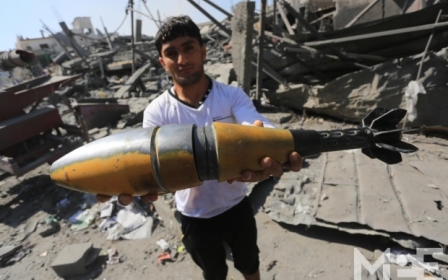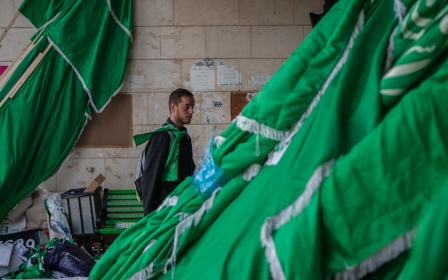When Israel would give up the bomb

The end came for the world's worst-kept secret when the US Defense Department recently released a document making it clear that Israel has the bomb.
A 1987 Pentagon document declassified in February unequivocally declares that Israel's nuclear weapons programme was then at the stage the US had reached between 1955 and 1960. It also says Israel had the potential to develop hydrogen weapons.
The document was released just days before Prime Minister Benjamin Netanyahu made his highly controversial speech to a joint session of Congress in which he argued why Iran had to be stopped from getting the bomb.
As the only nuclear power in the region, Israel has an unequalled strategic advantage. There doesn't appear to be any scenario in which Israel would willingly give up a nuclear arsenal that it still refuses to even confirm exists.
Or is there?
The only country to ever voluntarily relinquish its nuclear weapons is apartheid South Africa. When he announced in March 1993 - the same month Nelson Mandela was released - that Pretoria's six, airplane-borne weapons had been dismantled, then-president FW de Klerk said it was done to improve South Africa's international relations. It was also the first time South Africa had ever confirmed that it had the bomb.
De Klerk's reason has not been entirely accepted by experts. Speculation has led to various theories. One was that with the Soviet Union gone, South Africa no longer needed its nuclear deterrent. Another was that it no longer needed the bomb as a means of blackmailing the US to come to its defence.
One credible theory is that Pretoria saw the writing on the wall: apartheid was doomed and South Africa would soon be led by a black government. The apartheid rulers concluded that it would be better to ditch the bomb altogether rather than letting it fall into the hands of the African National Congress and possibly shared with other African governments.
A former South African diplomat was quoted as saying Pretoria was “motivated by concern that it didn’t want any undeclared nuclear material or infrastructure falling into the hands of Nelson Mandela."
De Klerk had already scrapped apartheid laws, and announced that Mandela would be released by the time the bombs were dismantled.
When he announced that the nukes had been destroyed, de Klerk said: “This country will never be able to get the nuclear device again, to build one again, because of the absolute network of inspection and prevention which being a member of the NPT casts on any country.”
The parallels between South Africa and Israel are on the rise. After Netanyahu renounced his support for a Palestinian state in the heat of the final days of his re-election campaign (only to try to reverse it immediately afterward), both the US and the UN strongly implied that the alternative would be an apartheid Israel.
“A two-state solution is the only way for the next Israeli government to secure Israel as a Jewish and democratic state,” said Jen Psaki, the State Department spokeswoman, on 18 March, the day after Netanyahu's re-election. UN spokesman Farhan Haq said the same day that Secretary-General Ban Ki-moon “firmly believes” that a two-state solution and an end to the settlements is “the only way forward for Israel to remain a democratic state”.
Not quite believing my ears, I asked Haq if what he meant was that the alternative was an apartheid Israel. “I’ve said what I said,” he responded.
While many critics of Israel say it is already running a de-facto apartheid system in its rule over four million Palestinians without rights, legal apartheid would come with annexation of the West Bank and Gaza. That appears to be the reason annexation has been resisted.
But the longer a two-state solution remains a dream, the more a one-state solution becomes likely.
No less than two former Israeli prime ministers have said so. “As long as in this territory west of the Jordan River there is only one political entity called Israel, it is going to be either non-Jewish, or non-democratic. If this bloc of millions of Palestinians cannot vote, that will be an apartheid state,” said Ehud Barak in 2010.
Three years earlier, former Israeli Prime Minister Ehud Olmert said: “If the day comes when the two-state solution collapses, and we face a South African-style struggle for equal voting rights (also for the Palestinians in the territories), then, as soon as that happens, the state of Israel is finished.”
A former Israeli ambassador to South Africa, Alon Liel, put it even more bluntly. “In the situation that exists today, until a Palestinian state is created, we are actually one state. This joint state - in the hope that the status quo is temporary - is an apartheid state.”
Without full Palestinian suffrage, Israel is increasingly facing a hostile international reaction. Israel fears the budding boycott, divestment and sanctions movement could grow to the scale of sanctions that pressed Pretoria to end apartheid.
A one-state solution, in which all Palestinians would have a vote would almost certainly mean the election of a Palestinian government to rule both Arabs and Israelis, much as a black South African government rules blacks and whites. Despite its violent past, South African has shown how the communities could coexist.
It seems nearly inconceivable today that Israel would become a single state with a Palestinian Arab government. But it was once inconceivable that South Africa would be led by a black government.
If that day of a peaceful transition to a single, democratic state to replace Israel should come, is it conceivable that Israeli leaders would allow their nuclear arsenal to be controlled by an Arab government?
The views expressed in this article belong to the author and do not necessarily reflect the editorial policy of Middle East Eye.
Photo: Israeli Merkava tanks pass near the border with the Gaza Strip on their way back from shelling the coastal enclave on 5 August 2014
New MEE newsletter: Jerusalem Dispatch
Sign up to get the latest insights and analysis on Israel-Palestine, alongside Turkey Unpacked and other MEE newsletters
Middle East Eye delivers independent and unrivalled coverage and analysis of the Middle East, North Africa and beyond. To learn more about republishing this content and the associated fees, please fill out this form. More about MEE can be found here.





